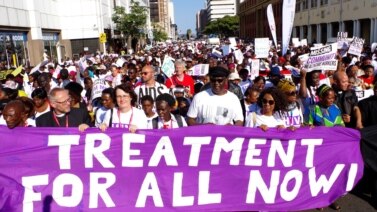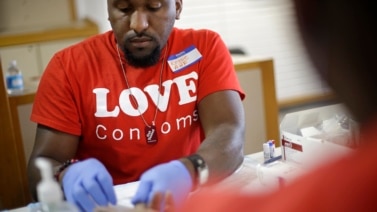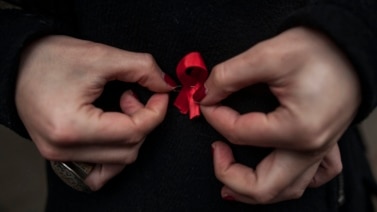Thursday is World AIDS Day.
For almost 30 years, the United Nations has marked World AIDS Day on December 1.
People often note the number of deaths from AIDS, short for acquired immune deficiency syndrome. The virus has killed tens of millions of people since it was first identified in the 1980s.
But on this World AIDS Day, there is more hope than ever before that researchers are getting close to finding a vaccine to protect against infection.
Much has happened since the first World AIDS Day observance in 1988. Countries where people did not talk about the virus now test people and treat those who are infected.
Mothers with HIV -- the virus that causes AIDS -- can give birth to healthy babies and live to raise them. Drugs can keep the virus from spreading.
And now, scientists are discussing the possibility that a vaccine and cure may be developed.
On Monday, researchers in South Africa began injecting thousands of volunteers with a possible vaccine.
Other researchers are examining whether the body's own defenses against disease can help fight the virus.
An American study shows this may be possible. One of the researchers was Pablo Tebas of the University of Pennsylvania. Dr. Tebas spoke to VOA on Skype.
“We infuse antibodies into the patients, the participants in the study, and we want to see if those antibodies will control the HIV virus -- will keep it quiet, and prevent the virus from coming back when we stop antiretroviral therapy.”
The research in controlling HIV with antibodies is similar to that being done in the fight against cancer. Proteins are used to attack cancer cells. Like cancer, HIV hides in cells. If a person stops taking anti-AIDS drugs, the virus returns.
“You want to eliminate the cells that harbor the virus and by making the immune system more active, in finding and eliminating those cells.”
The researchers discovered that the antibodies suppressed HIV for 21 days. The goal is to find a combination of antibodies that can suppress the virus for six months to a year. Then, those infected will no longer have to take medicine every day for the rest of their lives.
A new test using two antibodies should begin in the next few months.
I'm Anne Ball.
VOA's Carol Pearson reported this story from Washington. Christopher Jones-Cruise adapted the report for Learning English. George Grow was the editor.
We want to hear from you. Write to us in the Comments Section, or visit our Facebook page.
Words in This Story
infuse - v. to cause (something, such as a quality) to be added or introduced into a person or thing
antibody - n. a substance produced by the body to fight disease
participant - n. a person who is involved in an activity or event; a person who participates in an activity or event (often + in)
antiretroviral therapy - n. medicines used to control and suppress HIV, the virus that causes AIDS
harbor - v. to hold or contain (something)




